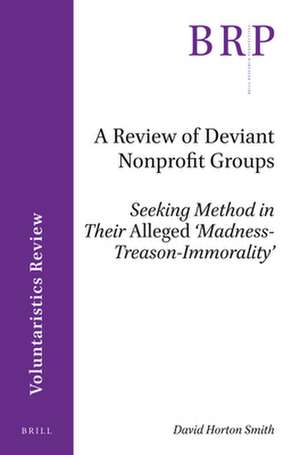A Review of Deviant Nonprofit Groups: Seeking Method in Their <i>Alleged</i> ‘Madness-Treason-Immorality’: Brill Research Perspectives in Humanities and Social Sciences / Voluntaristics Review, cartea 16
Autor David Horton Smithen Limba Engleză Paperback – 20 mar 2019
Din seria Brill Research Perspectives in Humanities and Social Sciences / Voluntaristics Review
- 15%
 Preț: 396.35 lei
Preț: 396.35 lei - 15%
 Preț: 395.94 lei
Preț: 395.94 lei - 15%
 Preț: 396.35 lei
Preț: 396.35 lei - 15%
 Preț: 399.26 lei
Preț: 399.26 lei - 15%
 Preț: 395.94 lei
Preț: 395.94 lei - 15%
 Preț: 396.35 lei
Preț: 396.35 lei - 15%
 Preț: 394.74 lei
Preț: 394.74 lei - 15%
 Preț: 397.15 lei
Preț: 397.15 lei - 15%
 Preț: 395.94 lei
Preț: 395.94 lei - 15%
 Preț: 396.76 lei
Preț: 396.76 lei - 15%
 Preț: 399.26 lei
Preț: 399.26 lei - 15%
 Preț: 395.85 lei
Preț: 395.85 lei - 15%
 Preț: 389.01 lei
Preț: 389.01 lei - 15%
 Preț: 389.01 lei
Preț: 389.01 lei - 15%
 Preț: 396.45 lei
Preț: 396.45 lei - 15%
 Preț: 396.35 lei
Preț: 396.35 lei - 15%
 Preț: 396.35 lei
Preț: 396.35 lei
Preț: 398.78 lei
Preț vechi: 469.15 lei
-15% Nou
Puncte Express: 598
Preț estimativ în valută:
76.31€ • 83.15$ • 64.30£
76.31€ • 83.15$ • 64.30£
Carte indisponibilă temporar
Doresc să fiu notificat când acest titlu va fi disponibil:
Se trimite...
Preluare comenzi: 021 569.72.76
Specificații
ISBN-13: 9789004400146
ISBN-10: 9004400141
Dimensiuni: 155 x 235 mm
Greutate: 0.27 kg
Editura: Brill
Colecția Brill
Seria Brill Research Perspectives in Humanities and Social Sciences / Voluntaristics Review
ISBN-10: 9004400141
Dimensiuni: 155 x 235 mm
Greutate: 0.27 kg
Editura: Brill
Colecția Brill
Seria Brill Research Perspectives in Humanities and Social Sciences / Voluntaristics Review
Cuprins
Contents
A Review of Deviant Nonprofit Groups: Seeking Method in their Alleged ‘Madness-Treason-Immorality’
David Horton Smith
Abstract
Keywords
Editor’s Introduction: The Neglected Dark Side of Voluntarism and the Nonprofit Sector: Larger Context of the General Theory of Deviant Nonprofit Groups
1 Introduction and Research Background
2 Five Broader Analytical Categories of DNGs and Twenty-Five DNG Purposive-Goal Types
3 Study Procedure and Methodology
4 Why Do DNGs Begin to Exist? The Origins Phase
5 Why Do People Usually Join and Participate in DNGs as Members?
6 What Is the Usual Internal Structure and Leadership of DNGs?
7 What Is the Usual Ideology of DNGs?
8 What Are Usual Nonmember Reactions to DNGs and What Life Cycle Changes and Impacts Tend to Occur?
9 Conclusions and Needed Future Research
Appendix: Illustrations of Alleged Madness-Treason-Immorality for Twenty-Five DNG Types
Author Biography
A Review of Deviant Nonprofit Groups: Seeking Method in their Alleged ‘Madness-Treason-Immorality’
David Horton Smith
Abstract
Keywords
Editor’s Introduction: The Neglected Dark Side of Voluntarism and the Nonprofit Sector: Larger Context of the General Theory of Deviant Nonprofit Groups
1 Introduction and Research Background
2 Five Broader Analytical Categories of DNGs and Twenty-Five DNG Purposive-Goal Types
3 Study Procedure and Methodology
4 Why Do DNGs Begin to Exist? The Origins Phase
5 Why Do People Usually Join and Participate in DNGs as Members?
6 What Is the Usual Internal Structure and Leadership of DNGs?
7 What Is the Usual Ideology of DNGs?
8 What Are Usual Nonmember Reactions to DNGs and What Life Cycle Changes and Impacts Tend to Occur?
9 Conclusions and Needed Future Research
Appendix: Illustrations of Alleged Madness-Treason-Immorality for Twenty-Five DNG Types
Author Biography
Notă biografică
David Horton Smith (Ph.D. Harvard University, 1965) is Research and Emeritus Professor of Sociology, Boston College, USA. Founder (1971) of the Association for Research on Nonprofit Organizations and Voluntary Action/ARNOVA (www.arnova.org) and NVSQ, he is founding editor of this journal.
